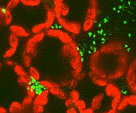Plant Pathology, Department of

Department of Plant Pathology: Faculty Publications
ORCID IDs
Serge J. Edmé https://orcid.org/0000-0003-3454-0809
Gautam Sarath https://orcid.org/0000-0002-3145-9493
Rob Mitchell https://orcid.org/0000-0003-4525-2335
Satyanarayana Tatineni https://orcid.org/0000-0003-0395-6000
Christian Tobias https://orcid.org/0000-0002-7881-750X
Document Type
Article
Date of this Version
2021
Citation
Crop Science. 2021;61:1652–1665.
DOI: 10.1002/csc2.20392
Abstract
Obtaining good accuracy and reliability of estimated breeding values is essential to increase the efficiency of a plant breeding program. Genetic variation was assessed for categorical (Virc) and binary (Virb) mosaic (caused by Panicum mosaic virus), dry matter (DMY) and predicted ethanol (Etoh) yields, and lignin content (Klason or KL, and acid-detergent or ADL) in a Summer–Kanlow switchgrass (Panicum virgatum L.) population. Breeding values were predicted with the restricted maximum likelihood–best linear unbiased prediction (REML-BLUP) approaches using a multivariate phenotypic (PBLUP) and animal (ABLUP) models, integrating a three-generation pedigree (1,622 half-sibs) in ABLUP and not in PBLUP. Models were compared in their precision (accuracy and reliability) in assessing genetic parameters and estimating breeding values. The models were similar in most aspects, allocating the highest heritability (ℎ2i) values to DMY (.38 ± .035 vs. .41 ± .035), Etoh (.46 ± .031 vs. .42 ± .033), and Virc (.43 ± .046 vs. .37 ± .047) and the lowest (.17 ± .032 to .30 ± .044) to KL, ADL, and Virb. Genetic correlations were always larger than residual and phenotypic correlations. Intermediate or strong additive genetic control suggest that selecting for high-biomass genotypes will slightly increase lignin content and simultaneously impart mosaic tolerance. Mitigating an increase in lignin content will require including Etoh in a selection index based on its much stronger negative correlation (rG = −.63) with lignin. In this population, accuracy values ranged from .06 to .94 (PBLUP) and from .26 to .92 (ABLUP) and corresponding reliability ranged from .004 to .89 and from .07 to .87. However, ABLUP improved average reliability of DMY and Etoh by 11% and of other traits by 4–5% over the PBLUP model. The ABLUP was a better model over PBLUP, which is a valid analysis in the absence of a pedigree.


Comments
U.S. government work